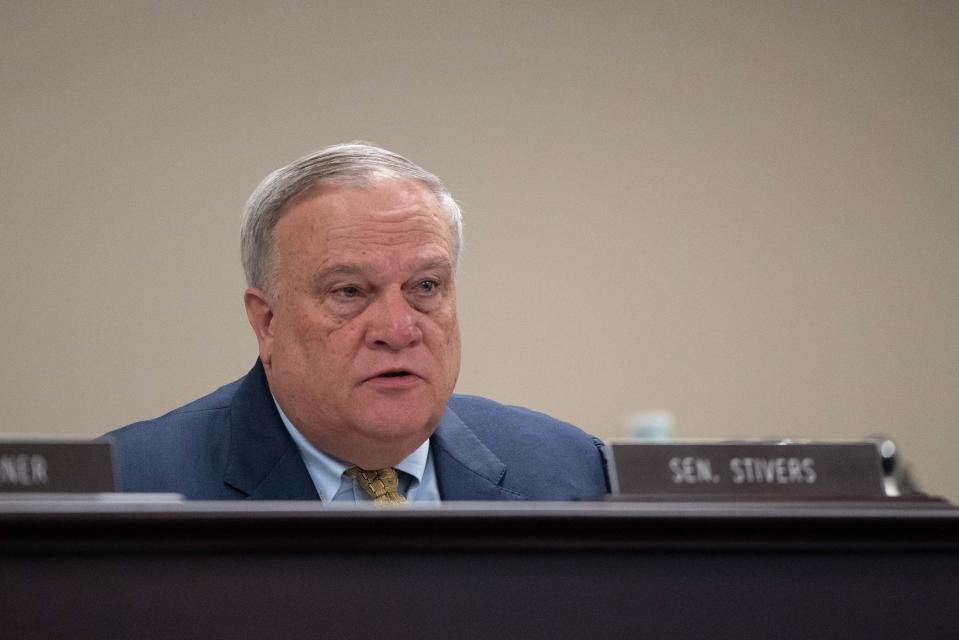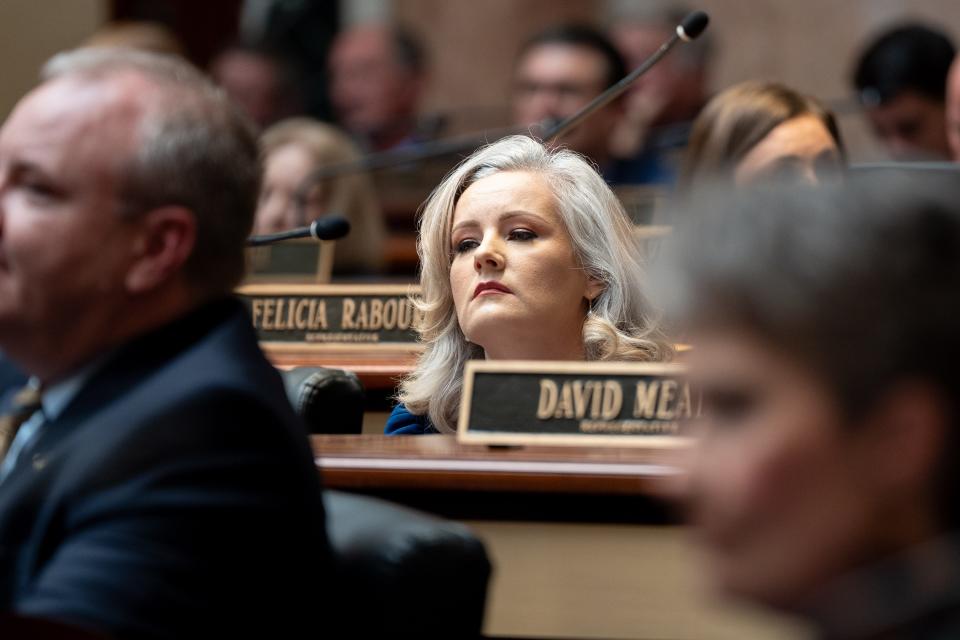As GOP divisions roil Congress, Kentucky legislative leaders maintain control ― mostly
- Oops!Something went wrong.Please try again later.
- Oops!Something went wrong.Please try again later.
- Oops!Something went wrong.Please try again later.
- Oops!Something went wrong.Please try again later.
FRANKFORT — The growing divide in the GOP has made it more difficult to lead on a national level, as evidenced by the ouster of the previous House speaker and the challenges of his predecessor.
But in Kentucky, Republican leadership has managed to keep its leverage and present a — mostly ― unified front.
There was plenty for the majority of Republicans to agree on during the legislative session that ended Monday. For instance: putting school choice funding before the voters, creating tougher penalties for certain crimes and targeting Louisville's government and school system.
But issues like diversity, equity and inclusion (DEI) sparked division, and other more hard-right proposals failed to gain key support from the party.
Stephen Voss, a political scientist at the University of Kentucky, said compared to other states, Kentucky leadership still has the power to gate keep some of the more extreme proposals.
Senate President Robert Stivers, R-Manchester, told reporters last week that when it comes to making decisions on what to bring to the floor, the caucus follows the "Hastert rule," which is named after former U.S. Speaker of the House Dennis Hastert.

The rule basically says a bill has to have majority support of the caucus before it will be brought to the floor for a vote.
"To say that everybody's happy at the end of the day, that may not be true, but they know they've been given a fair shake," Stivers said "That's the most important thing, is that everybody has a chance to express their opinion and try to convince the caucus, because and if we don't have the Hastert Rule met, then it doesn't come to the floor."
Some hard-right bills made little movement this session
On one side of the aisle, some Republicans want to move beyond the divisive politics driven by former President Donald Trump. On the other side are the "Make America Great Again" supporters, who often fall in line with wherever Trump’s agenda leads.
Alan Abramowitz, a political scientist at Emory University, said Trump has been exerting more control on the Republican Party.
"The people who are Republicans who are closely aligned with Trump are more aggressively pursuing immigration, cultural issues, abortion (and) pursuing changes in voting," Abramowitz said.
In Congress, the divide has caused chaos and put the House, which is controlled by the GOP, into deadlock over policies such as Ukraine aid.
On the state level, in Missouri, Senate leadership stripped members from the Freedom Caucus from committee leadership positions after they held up floor action for 11 hours by trying to force movement on certain bills.
Kentucky Republicans may not agree on everything, but it hasn't gotten to that extreme in the commonwealth.
Tres Watson, a longtime Kentucky political consultant and former GOP spokesman, said Kentucky Republicans have been able to keep unity because of a common goal: working against Democratic Gov. Andy Beshear.
That can be seen toward the end of this year's session when the legislature overrode nearly all of Beshear's vetoes on the penultimate day of session.
Still, the far-right is represented at the Statehouse, most notably by Northern Kentucky Reps. Savannah Maddox and Felicia Rabourn, and Sen. Lindsey Tichenor from Henry County.

Watson said dissension usually comes from the northern region because it’s demographically different from the rest of the state. He said the population there tends to lean libertarian and consist of conservatives from the Cincinnati suburbs.
And those Northern Kentucky representatives pushed for legislation this session that aligns with some MAGA movement principles.
One of those bills is Senate bill 295, which would have banned the requirement of COVID-19 vaccines for “student enrollment, employment or medical treatment.”
Tichenor, R-Smithfield, is the bill's primary sponsor and said on the Senate floor on March 26 that data proves the vaccines are "ineffective and dangerous," which contradicts federal guidance. Her comments mirror similar language used by other MAGA Republicans who resist getting the vaccine.
The bill ended up passing on a 25-11 vote in the Senate, with GOP Sens. David Givens, Christian McDaniel and Julie Raque Adams crossing party lines to vote against it. But the bill stalled in the House, failing to even get a committee assignment.
Watson said anti-vaccine bills usually receive pushback because they restrict businesses, which he believes is one area of disagreement among the Republican Party.
Another Northern Kentucky representative, Steve Rawlings, R-Burlington, introduced House Bill 47 that would have expanded religious freedom by allowing individuals to sue one another over religious freedom violations.
Some states that have a Republican trifecta have passed similar laws, including Iowa and Utah.
Kentucky's bill had the support of others from the region, including Maddox and Rabourn.
But HB 47 didn’t make significant movement past getting a committee's approval on a 14-6 vote.
Perhaps the most striking example involved Senate Bill 6, known as the "anti-DEI" bill. GOP lawmakers seemed to agree that DEI policies at Kentucky colleges and universities were a problem, but couldn't decide on how far to go with a solution.
The bill ground to a halt before the veto period began. It showed up again on the final night of the session on Monday, but was never taken up on the Senate floor. Passing it then would have risked a veto from the governor.
Earlier, the House scrapped the Senate's version of the bill and replaced it with House Bill 9, which came down harder on diversity, equity and inclusion policies. The Senate never voted to concur with the House's changes.
Maddox posted on X, formerly known as Twitter, that "there were a lot of senators who would've easily concurred, so it's disappointing that it didn't make it across the finish line."
Tichenor also expressed similar thoughts, saying on X she was disappointed the bill wasn't brought to a vote before the veto period began.
On the last day of the session before the veto period, Stivers said the amended version of the bill was "contentious within our caucus."
Watson said when it comes to social issues dealing with vaccinations or policy in higher education, such as DEI, there's often disagreement over government involvement.
"I think there's a lot of disagreement as to how far do we insert the government into these situations," Watson said. "There's disagreement on the solution because a lot of conservatives have fought for a lot of years to get the government out of these situations."
Budget-year priorities may have led GOP to step back on social issues
The commonwealth was one of the fastest states to outlaw abortion after the U.S. Supreme Court overturned Roe v. Wade in 2022. The preemptive state law that was enacted in 2019 is also known as the “trigger law,” which would end all abortion services if Roe v. Wade was ever struck down.
During the 2023 legislative session, the General Assembly also passed a sweeping anti-trans law that bans gender-affirming care for trans youth and schools from giving lessons "studying or exploring" sexual orientation or gender identity, among other measures.
This year, though, several bills relating to the "culture war" or abortion issues missed the deadline to pass before the veto period began.

Trey Grayson, a former GOP Kentucky Secretary of State, said there are two reasons why the party took a step back on social issues — to focus on the budget and to prioritize other issues like the Safer Kentucky Act and the "school choice" constitutional amendment.
That meant some bills, like Tichenor's measure restricting adult-oriented businesses and Republican Rep. Nancy Tate's "Baby Olivia" act, failed to pass both chambers before the veto period began.
"The budget is such a big deal in these 60-day sessions," Grayson said. " This budget, because it had that surplus, I think that just occupied a lot of time."
This article originally appeared on Louisville Courier Journal: Kentucky Republican leadership keeps control during Congress division

